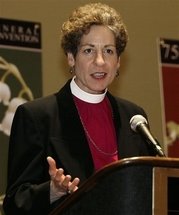
The new Presiding Bishop of Episcopal Church
Bishop election upsets Episcopal diocese
By RACHEL ZOLL, AP Religion Writer
One of three Episcopal dioceses that rejects ordaining women appealed for help Monday from the head of the Anglican Communion after the U.S. church elected a female bishop as its national leader, the first woman ever to lead an Anglican province.
Bishop Jack Iker of the Diocese of Fort Worth, Texas, read a short statement from the floor of the Episcopal General Convention, asking Archbishop of Canterbury Rowan Williams to put the diocese under the oversight of another Anglican leader.
On Sunday, the convention chose Nevada Bishop Katharine Jefferts Schori as the first female presiding bishop for the Episcopal Church, the U.S. arm of the global Anglican Communion.
Supporters of women's ordination rejoiced that Jefferts Schori won, but the vote complicates attempts to maintain unity in both the American denomination and the Anglican Communion.
Three years ago, Episcopalians stunned the communion by consecrating its first openly gay bishop — V. Gene Robinson of New Hampshire. The convention will decide this week whether to appease angry overseas archbishops by temporarily barring homosexuals from leading dioceses.
Iker said in a separate statement that Jefferts Schori's election continued policies that have "divided the Episcopal Church, impaired our relationship with a majority of other Provinces, and brought the Anglican Communion to the breaking point."
Many Anglicans believe women should not be ordained. Only two of the 37 other Anglican provinces — New Zealand and Canada — have female bishops, although some allow women to serve in the post.
Williams released a brief statement Monday acknowledging that Jefferts Schori's election would cause problems among Anglicans, but pledged his support "as she takes up a deeply demanding position at a critical time."
Beside Fort Worth, the two U.S. dioceses that do not accept women priests are Quincy, Ill., and San Joaquin, Calif., according to the Anglican Communion Network.
All three are members of the network, which was formed in response to Robinson's confirmation and represents about 10 U.S. traditional dioceses and more than 900 parishes that remain within the denomination but are considering breaking away.
The outcome of the General Convention will shape their response and that of overseas Anglican leaders.
On Monday, delegates were scheduled to take up an Anglican demand for a promise from the American church not to install any more gay bishops, at least for now.
The proposal being sent to the floor, however, stops short of a moratorium and instead urges dioceses to "refrain from" choosing bishops "whose manner of life presents a challenge to the wider church." Delegates can revise or reject the measure.
Debate begins in the House of Deputies, comprised of lay people and clergy, then goes to the House of Bishops for their approval.
Jefferts Schori would not say whether she thought the church should stop electing gay bishops for now since delegates hadn't yet voted on the measure. The meeting ends Wednesday.
However, she had voted to confirm Robinson in 2003 and supports blessing ceremonies for same-sex couples. She will be installed for a nine-year term Nov. 4 in the Washington Cathedral.
The presiding bishop represents the Episcopal Church in meetings with other Anglican leaders and with leaders of other religious groups. But the presiding bishop's power is limited because of the democratic nature of the church. The General Convention is the top Episcopal policy-making body and dioceses elect their own bishops.
On the Net:
Episcopal Church: http://www.episcopalchurch.org
Copyright © 2006 The Associated Press.






No comments:
Post a Comment